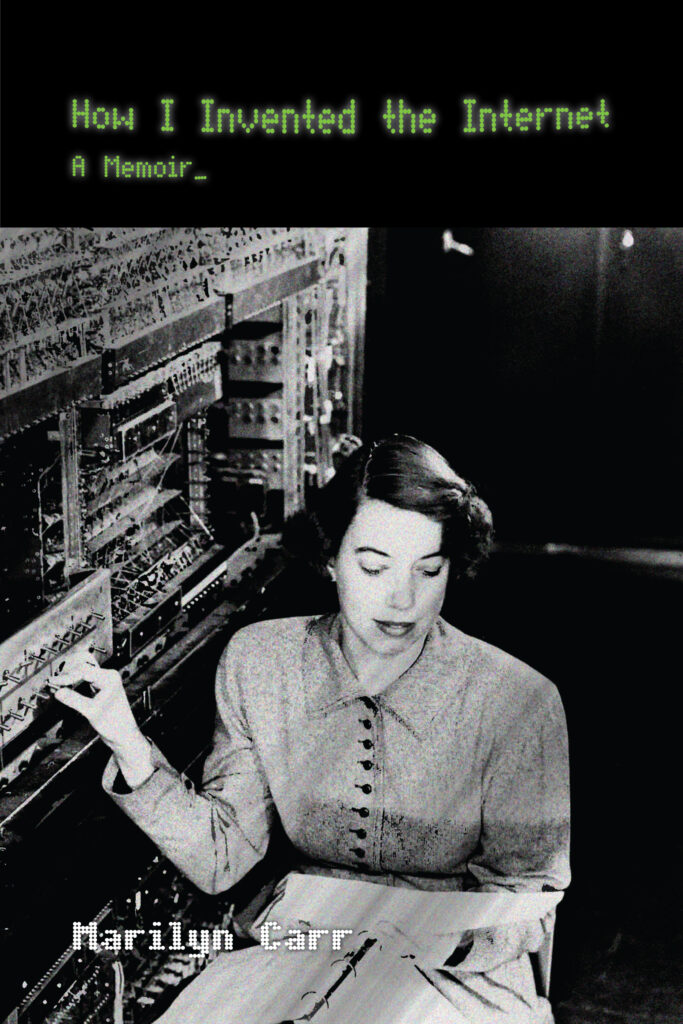
Very excited to announce the second installment of my memoirs (what? am I somebody important? who the heck keeps writing about herself? hint: I do), How I Invented the Internet, available September 30, 2022 wherever fine books are sold online (softcover and eBook, and in case you missed it, all of the above plus audiobook for Nowhere like This Place are also available. Here is an excerpt.
How I Invented the Internet: Excerpt
1979
Dataline’s Toronto office is in a low-rise industrial loft-like space, long before industrial loft-like workplaces are a thing. The windows are sixteen-pane safety-glass panels held together by black wrought-iron mullions. My interview is with Don Kennedy, vice president of operations. I walk up six stairs from the parking lot to the front door. I’m wearing my best interview clothes: a grey skirt suit I got on sale, a blue-striped dress shirt I bought from the boys’ department, nylons, and grey pumps. I stumbled on the children’s department shirt-shopping thing by accident, after too many attempts to buy something that wasn’t a frilly blouse. My pitch-brown hair is cut in a Dorothy Hamill wedge that I’m trying to grow out. Dorothy is so 1976 and here we are six months away from 1980. I carry a brand-new leather briefcase. Completely empty. Not even a sandwich inside.
Fenella, Don’s secretary, comes to collect me. She’s exactly my height and weight and probably struggles just as much as I do to keep above one hundred pounds. Her blond hair is in a bun secured by a scrunchy, and her silk blouse and wide trousers are both black. She has a clipped English accent and an aloof manner. Don must be very important. Fenella presses the elevator button and we wait in uncomfortable silence for five minutes until the elevator arrives. I guess she doesn’t want to reveal company secrets to someone who doesn’t yet work here. The door opens excruciatingly slowly and we squish into a space that could fit four people with maximum discomfort. Fenella presses the up button and the elevator lurches, stalls, then proceeds on its ascent.
“That’s a relief,” she says. “I was stuck in here for most of the day yesterday.” The elevator eventually makes it up to the second floor. The door opens on a room that’s dotted with workspaces I assume are for the worker bees, hived off by curved four-foot-tall cloth dividers covered in what looks like indoor-outdoor carpet, but the orange kind not the green kind. The dividers are perched on squat metal feet that are angled directly toward the door. Maybe the dividers are smarter than anyone in this room. The executive offices hug the exterior cinder-block walls, each with a full view of the parking lot. This is not as fancy as it sounds.
The cavernous space is lit by warehouse lights suspended from the fifteen-foot ceiling. Their ribbed industrial glass domes create elongated circles on the floor, as welcoming as searchlights. Fenella and I walk across the room, while men’s heads pop up above the cubicle walls like groundhogs checking to see if spring has arrived. Apparently, girls in suits are as rare in these parts as swaths of sunshine in February.
Fenella ushers me into Don’s office and smiles enigmatically. Don’s short-sleeve dress shirt is accented with a wide tie decorated with orange and pink Hawaiian flowers. His credenza holds a tray overrun with bottles of booze, a random selection of crystal glassware, and a silver ice bucket. His desk has one of those green felt blotters trimmed with leather, which I kind of thought had gone out with the fountain pen, but it’s partially obscured by a computer terminal, so maybe it’s meant to be ironic. Don’s round black ashtray, as big as a hubcap, takes up the rest of the desk. At this moment, there’s room for maybe one more butt if someone’s completely desperate to stamp out a smoke.
“Have a seat,” Don says. I unclench my grip from the handles of my briefcase, set it on the floor in front of Don’s desk, and arrange myself with a confident ballet posture aligned with the straight back of the minimalist wooden guest chair. My narrow wool skirt has slits on either side. This seemed like a good idea because they make it easier to walk. I have never sat in this suit. I feel the cold wood on my legs and look down to see that, when sitting in a way I consider to be proper, the slits create a thigh aperture almost all the way to my waist. I slide forward to the edge of the chair and rearrange my legs by crossing them at the ankles. Don is too immersed in his monologue to notice. At least I dearly hope so.
“Let me tell you about the company,” Don says. “Dataline was formed three years ago when Joe, our founder, saw an opportunity to provide economical computing power to companies that can’t afford their own computer. It’s a new business model called timesharing. The way it works is that we have a bunch of types of business software, for accounting and expense reporting and stuff. We rent out the software, the computing power required to run it, and a place to store the data. We also install the terminals so the customers can access the computers, and train them how to use the software we provide. I think the best way to picture it is this: we own the razors and the razorblades. And everyone needs to shave!” He seems very pleased with his analogy. “Your resume says you know Fortran, right?” “Yes,” I say. “I haven’t used it in a while, though.” Actually, I barely used it in the first place.
